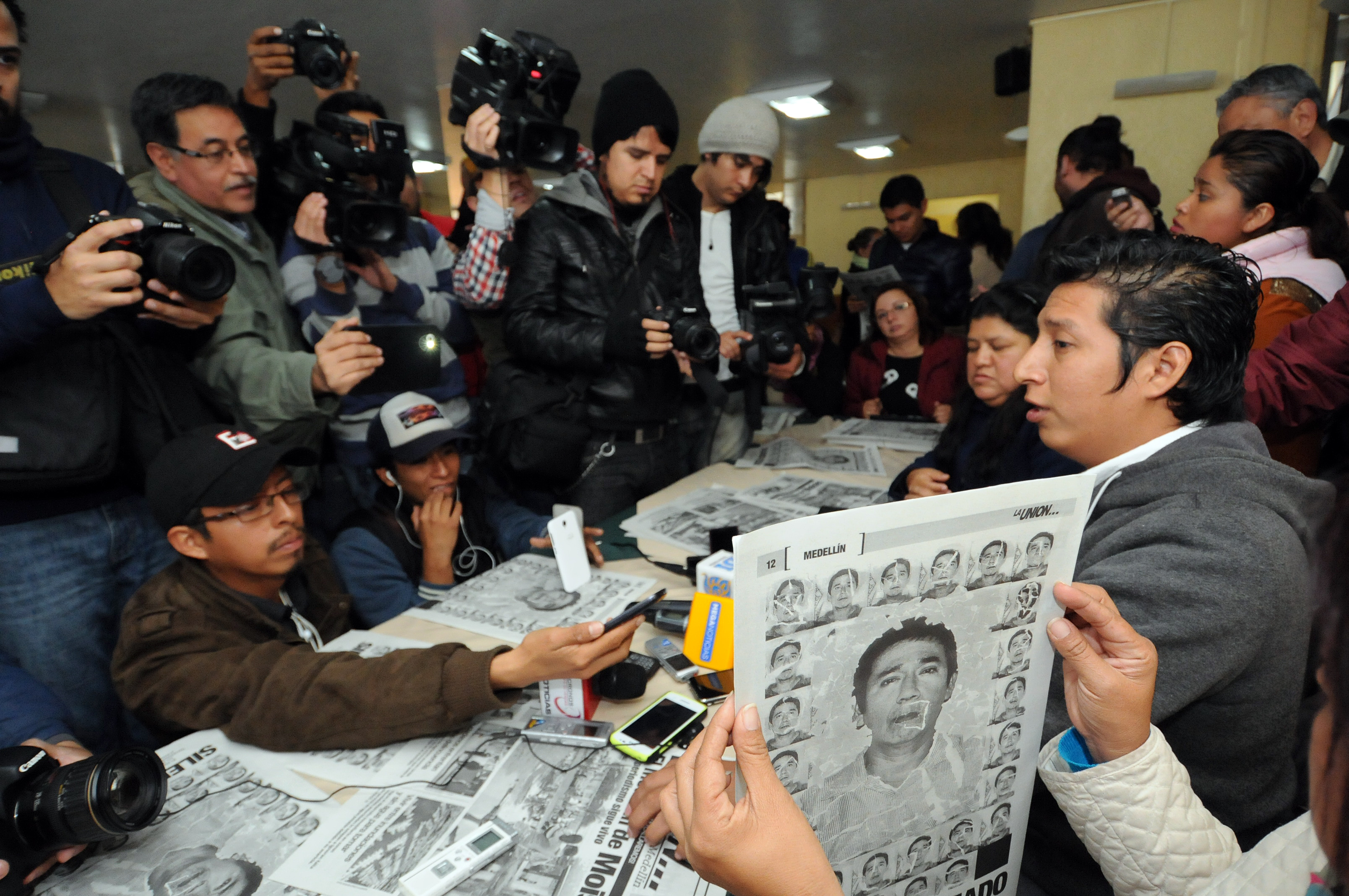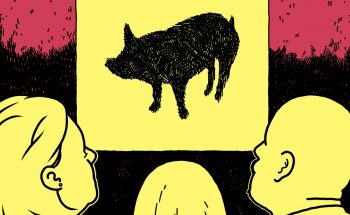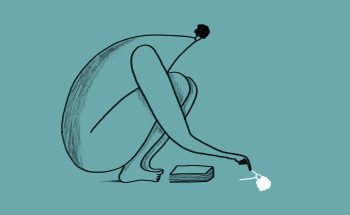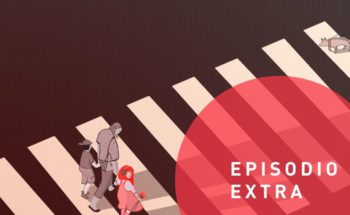
Translation: La Unión
Share:
Translation by Patrick Moseley
This episode of Radio Ambulante is possible thanks to MailChimp. More than 7 million people and businesses worldwide use MailChimp to send email and newsletters. It’s easy! Even an adult can do it. To learn more, visit mailchimp.com
Moisés Sánchez: Hello, hello, hello, yes, hello, hello…
Daniel Alarcón: This is Moisés Sánchez. And here he is promoting his weekly publication, La Unión.
Moisés Sánchez: The information you want to know about Medellín, here in the weekly newspaper La Unión. Coming soon!
Daniel Alarcón: The Medellín Moisés is referring to is Medellín de Bravo, a municipality in the Mexican state of Veracruz
And this is Jorge Sánchez, his son.
Jorge Sánchez: He started out with informative fliers that were anonymous, he didn’t sign them, they just said La Unión, with a little castle here, with people climbing up…
Daniel Alarcón: Jorge is 30 and also lives in Mendellín. And he remembers how at some point…
Jorge Sánchez: If I remember correctly, it was 84 or 89 when he started signing his name.
Daniel Alarcón: Strange as it may seem, in Mexico having a homemade newspaper, made by hand, can put you at risk.
As we all know, Mexico is one of the most dangerous countries in the world for journalists. According to statistics coming from the International Federation of Journalists since 1990, Mexico has become the third most dangerous country in the world. After just Iraq and the Philippines. And Reporters Without Boarders has reported more than 80 reporters killed and 17 missing since 2006, when the so-called war against drugs began in Mexico. And Veracruz has become one of the most dangerous regions.
And of course, in this context, publishing your own homemade newspaper and signing your articles with your first and last name is an act of bravery.
And it is important to keep this in mind in order to understand what comes next.
Because in January 2015 Moisés Sánchez disappeared.
Welcome to Radio Ambulante, I’m Daniel Alarcón.
And before we continue, a warning: this episode tells a difficult story, with descriptions of violence that can be hard for some listeners.
Carola Solé went to Medellín de Bravo to speak with Jorge Sánchez, Moisés’ only son.
——————-
Carola Solé: On January 2nd, Jorge took a bus home and got a call from his neighbor. They had kidnapped his father.
Jorge quickly got off and took a taxi.
Jorge Sánchez: Well, I come home and there’s nobody there. I go to the neighbor’s house where my mother was.
Carola Solé: And he found her sitting in shock.
Jorge: I asked what happened, that’s all, and all she could say was: “They took him.”
Carola: It all happened very fast. After a while, his mother managed to tell him that around seven in the evening, Moisés came home, tired from work and went to bed.
Jorge: And then five vehicles arrive, they stop out front, they practically close off the street.
Carola: Six armed men got out of the cars and entered the house by force.
Jorge: They ask for my father, my mother doesn’t say anything because she’s in shock, she just holds the children and starts to pray.
Carola: The men began to search the house until they found Moisés’ room on the second floor. They brought him down, kicking and screaming, and they took him along with his camera, a tablet, a small laptop and his two cell phones.
Jorge: When the neighbors see these trucks, these cars come, they call the police and they don’t answer…
Carola: The police came about ten minutes after Jorge. But…
Jorge: They didn’t have orders to carry out operations, they were just on patrol without doing anything. And I say, listen you should do something and this and that. And they don’t, they don’t move.
Carola: Jorge was desperate; he didn’t know what to do.
Jorge: You find yourself in a situation you aren’t prepared for. You never imagine that something like this will happen to you…
Carola: But, worse still, is the helplessness of feeling like there is nothing you can do… And the outrage.
Jorge: Because you are seeing the people who are supposed to take care of you, the ones who should be out looking and conducting operations, aren’t doing that because it seems like they aren’t human, they don’t feel people’s pain.
Carola: Jorge tried to calm down. He took some photos from the house because he wanted to have evidence of what it looked like. And he decided not to let anyone come in until the people from the district attorney’s office arrived. But more than three hours went by and they didn’t come. Then, he had to make a decision: Or remain silent. Or…
Jorge: Expose it and demand justice, putting yourself at risk, putting your family at risk.
Carola: The Sánchez lived — and still live– in a humble and very unsafe neighborhood, an hour’s drive away from Puerto de Veracruz. Their house is simple. At first glance, it looks like their neighbor’s houses: it has unpainted concrete walls and doesn’t have doors on the inside. Neither does it have sewerage system.
But since this happened, they have stopped being like the others. Today there are three police officers watching the house day and night. Surrounded by a chain-link fence And nine surveillance cameras.
But that came later. The day of the kidnapping, when Jorge saw that the district attorney’s office wasn’t coming, he started to call his father’s journalist friends, in despair. He hoped this would do something. And the call was effective. The news started to run through the media.
News: “A new case of violence against journalists shakes Mexico after the confirmed kidnapping of Moisés Sánchez Cerezo, director of and reporter for the newspaper La Unión”… “In the state of Veracruz they are searching for the journalist and activist Moisés Sánchez Cerezo.”
Carola: But in order to understand what comes next, I have to explain something: Moisés Sánchez didn’t study journalism. And, well, many people who practice journalism never studied it formally, but in the case of Moisés, this detail will become very important. In fact, Moisés didn’t study anything formally. He was born in Puerto de Veracruz in 1965 and had taken many jobs since his childhood.
Jorge: Well, he didn’t just work as a cab driver, he worked as a fruit and vegetable vendor, a cleaning supplies salesman, a newspaper vendor, a butcher. That is to say, he had a lot of jobs throughout his life.
Carola: Although he didn’t make much money in any of them, his job as a cab driver was perhaps his favorite, because he could go all around Medellín…
Jorge: And all of a sudden, he heard there was a protest, they closed off the street and he pulled over to cover the story, to inform people, take pictures, ask questions.
Carola: That journalistic curiosity lead him to create the weekly publication La Unión in the 80s. It was the only one written in and for Medellín. Basically it was a rudimentary social commentary publication with just one staffer: himself. There Moisés exposed his municipality’s problems.
In the beginning, the paper had an almost childish air. Moisés wrote short texts by hand, he illustrated them with drawings, cut and pasted them and made photocopies. It became a kind of mural that hung up in stores. Then it became a folded leaflet. But aside from the newspaper…
Jorge: He got the idea to make a kind of mobile radio station, if you’d call it that, or a portable radio, so he put the speaker on top of the truck.
Carola: And with the same megaphone he used to use to announce fruits and vegetables for sale, Moisés started reporting important pieces of news for the municipality:
Jorge: The transit authority had been extorting the people. In the town the neighbors are complaining about not having streetlights, the lack of benches.
Carola: One day, tired of the noise, the transit police called him out. They told him he couldn’t have that megaphone his taxi.
Jorge: I remember what he did next. He took the speaker off the taxi, put it on a bicycle and went through the streets like before. That is to say, nothing could stop him.
Carola: Moisés was also an activist. He encouraged his neighbors to complain about the problems in Medellín. But often he published his own denunciations in La Unión. He quoted himself in the third person in order to make his denunciations. But aside from that…
Moisés: You know us, you’ve seen us supporting and defending the victims of police extortion, we have marched together before injustice.
Carola: He also mounted a political campaign. In March 2014 he ran for municipal agent. That means he could have represented one of Medellín’s communities.
Moisés: March 23rd, vote José Moisés Sánchez Cerezo, municipal agent for El Tejar.
Carola: They didn’t elect Moisés, but he did manage to be a headache for several mayors.
Jorge: Yes, my father made enemies of several municipal presidents, but throughout the years, they never did anything to him, or made a move against him, because they knew that my father wasn’t someone you could just threaten and call it a day, if you threatened him, he wouldn’t stay quiet.
Carola: Just like he didn’t stay quiet about the last mayor, Omar Cruz, from the same conservative party that won the presidency with Vicente Fox and Felipe Calderón. Moisés criticized him through his media outlet. And he even dared to question him publicly: about garbage collection, about not following through with his “Safe Medellín” plan…
In the middle of December 2014, Moisés published a piece that managed to make waves outside of Medellín. Due to a lack of security in one of the municipality’s neighborhoods, a supposed self-defense group had formed.
Moisés: Here we are with the people of the Gutiérrez Rosas neighborhood, who are forming a self-defense committee, where today, Saturday, there was an act of aggression.
Carola: In the video he posted, filmed at night, you can see some people with machetes, but no one’s faces.
Moisés: Two people from this neighborhood were shot, receiving several gunshot wounds.
Carola: A few days later, Moisés joined this neighborhood movement that patrolled the streets with radios, whistles, nightsticks and machetes. And he became their leader.
Around this time, someone sent Moisés a message from the mayor. Apparently, Omar Cruz wanted to “teach him a lesson.” It’s not clear if this threat came because Moisés had joined the self-defense group or because of his constant criticism of the mayor, or because of a mixture of things…
What is clear is that the threat did not keep him quiet. A little later, at an event with some journalists, in front of everyone, Moisés shouted at the mayor that he had threatened him.
Moisés: After the aggression inflicted on me, after they attacked me. Do you remember? Do you remember? Acts of aggression were inflicted on me because of you.
Carola: This happened Saturday, December 20, 2014 a few weeks before the kidnapping. But Moisés didn’t take mayor Cruz’ threat very seriously. He felt like a survivor. Many journalists had died and…
Jorge Sánchez: Well, nothing happened to him, so making the analogy, if nothing happened to my father when violence was intense in Veracruz, then now that things had calmed down, it was less likely, right?
Carola: Jorge is referring to the dark period that started around 2011. Felipe Calderón’s Mexico was in all out war against drug traffickers and Veracruz was one of the war’s hottest centers.
Veracruz -so everyone understands- has one of the most important ports in Mexico and a good portion of the country’s petroleum. It is one of the states that gives the most votes to the PRI, president Peña Nieto’s party. This party has governed the state for the past 86 years.
And in 2011, Los Zetas had taken over the port, which is crucial for trafficking drugs into the United States. And the Jalisco Nueva Generación cartel also wanted control over it. The news at the time was terrifying. It was the period of decapitations, of 35 bodies thrown in front of the doors of a meeting of prosecutors…and it was also when the violence took on a new target: journalists.
Luz María Rivera: We reporters were in the middle of the criminal’s cross fire, but also the politicians’ inaction.
Carola: This is Luz María Rivera, a journalist from Puerto de Veracruz. She worked for a while for Notiver, the newspaper that was most critical of the state government, and now she is a correspondent for one of Mexico’s main newspapers, La Jornada. Luz María was a witness and survivor of those early years of the wave of violence against journalists.
Luz María: After Miguel and part of his family, there was Yolanda Ordaz, there was Huge, Esteban, Marisela, anyway, you know? Regina in Xalapa.
Carola: In the past five years she has attended the funerals of seven of her fellow journalists.
Luz María: It was terrible because the profession was affected, obviously, to use a military term, they demobilized us, you know?
Carola: Since Javier Duarte -from the same party as Peña Nieto- assumed control of the government of Veracruz in 2010, fifteen journalists have been killed.
At first, many of them were crime reporters and photographers reporting on the drug war, but little by little their profile broadened. And here is where the debate begins around Moisés’ kidnapping: Was he or wasn’t he a journalist? It’s clear to Luz María:
Luz María: Like Moisés, there are many people in the field of journalism in Veracruz today who present themselves as journalists, who aren’t.
Carola: What Luz María is suggesting is that not all of the homicides are necessarily related to freedom of expression.
Every time a journalist has been killed in Veracruz, governor Javier Duarte has tried to minimize the crime. He downplays the journalist’s influence, insinuates that he was involved in organized crime… In fact, a few hours after Moisés’ disappearance, the governor referred to him publicly as a “taxi driver” and a “neighborhood activist.” Not as a journalist.
And that is how Moisés’ profession became the topic of a national debate.
Carmen Aristegui: First the governor said: “Oh, it’s about a cab driver” like to disparage the issue.
Carola: This is Carmen Aristegui speaking about the case, 18 days after Moisés’ disappearance. Her radio program had the largest listenership in Mexico.
Carmen Aristegui: As if implying that he wasn’t really a journalist, but someone else who was made to disappear and who was involved in other things. What can you say about an initial statement like that?
Carola: And this is Darío Ramírez, the director of Artículo 19, an organization that promotes freedom of expression.
Darío Ramírez: His first line of defense is to say that this person wasn’t a journalist. But Moisés Sánchez gathered, collected, disseminated and published information. That is a journalistic exercise, Carmen…
Carola: Whether or not he deserved to be called a journalist, days went by and Moisés didn’t show. Jorge had met with governor Duarte a few days after the kidnapping and he brought with him several texts from La Unión. Duarte, according to Jorge, apologized for putting his father’s journalistic work into question and promised to find him.
Jorge: And the governor says to me he’s going to find him, he’s going to do everything possible to find him, that they’re already following the leads, and that they already know more or less where he is and who took him and so on.
But nothing Duarte said happened. When mayor Omar Cruz was called to testify in front of the district attorney of Veracruz — about ten days after the kidnapping — he said he had nothing to do with the case. And then, the mayor fled. Even today, more than a year later, there is no sign of him.
Three weeks went by without any news about Moisés. But one day Jorge got a call from the district attorney’s office. They told him: “We think we have your father’s body.” But…
Jorge: Of the four bodies they showed me, none of them was his.
Carola: Finally, on January 24th, the district attorney of Veracruz called Jorge to tell him that this time they had found his father’s body. Decapitated and dismembered.
And with that, Moisés became the 11th journalist killed under the Duarte government.
Jorge wanted to see the body.
Jorge: It was decomposing. It had been for several days, it wasn’t recognizable, but it was a very disturbing scene, very dismal, very shocking.
Carola: Jorge examined the body carefully, but he was so nervous and the body was is such poor condition, he had doubts. So he asked for another expert opinion from the Mexican attorney general’s office.
But before the family had the final results about the body, the Veracruz district attorney’s office gave a press conference. And said that it was in fact Moisés’ body.
District Attorney: Moisés Sánchez’ murder was carried out directly by mayor of Medellín’s driver.
Carola: This is the district attorney in the press conference. He gives the gruesome details of the killing: six police officers had kidnapped and killed on the same day, January 2nd, by order of mayor Omar Cruz.
District Attorney: In exchange for police protection so that his gang could conduct the sale of drugs in this municipality without any problems.
Carola: The attorney general showed a video in which former police officer Noé Rodríguez confessed in front of a camera that he had committed the crime along with five others.
Noé Rodríguez: Harry started cutting his throat, he had cut it off completely when he told me: now we’ve completed the order that the mayor of Medellín de Bravo gave us, because he was going around causing a stir in his community and with his work as a municipal leader.
Carola: Showing the public supposed confessions for high profile crimes is common in Mexico, but it is also a highly criticized practice. Because there can be torture behind the confession, because they do not respect the presumption of innocence on the part of the detained and furthermore, they harm families without being certain that they are telling the truth.
And in this case, the supposed killer, Noé Rodríguez, confesses that he didn’t even know whom he killed.
Noé Rodríguez: Then the next day I learned from the media that Mr. Moisés Sánchez wasn’t just as a cab driver, but also a journalist. Well we got scared. And I said to them, I told them look at all the uproar over Mr. Moisés Sánchez.
Carola: About fifteen days later, a new expert report from the attorney general’s office — which included dental and DNA evidence — confirmed that the body was in fact Moisés.
Jorge brought the body to his house for a wake. Upon arriving, he put the coffin in the living room.
Jorge: I think that is the moment when I realize how impactful the situation is, because well I see my mother who’s crying and who’s totally falling apart and I just reach out to hold her and be with her and cry with her and I forget about everyone else.
All that strength that I had shown up to that moment in front of the authorities, in front of the cameras, in front of whoever, well it came out from under me.
Carola: But Noé Rodríguez is the only one who paid for what happened, although he still hasn’t been sentenced. The other five police officers that presumably participated in the crime simply fled. There is no sign of them. The assistant commandant of the Medellín police, who was also the mayor’s bodyguard, was detained, but was freed after nine months. There was not sufficient evidence to prove that he had participated in planning or carrying out the crime.
None of the murders of journalists in Veracruz have been solved.
And governor Duarte continues to generate a lot of debate with his public declarations. On one hand he has assured the public that no one in his government is trying to silence journalists, that they respect freedom of expression and it is the narcos who are killing reporters. But on the other hand, he says things like this:
Duarte: Behave yourself; we all know who is going down the wrong path.
Carola: This was at an event with journalists in July 2015. Duarte issued this warning:
Duarte: We’re going to shake the tree and many bad apples are going to fall out. And the only ones who will be affected are those who are linked to the criminal organizations. We must not confuse freedom of expression with transmitting expressions of criminals through the media.
Carola: Duarte is referring to the payment that some drug cartels make to journalists. So that they will side with them. But the governor has never said that about Moisés’ case.
With mayor Cruz and the five police officers still free, the Sánchez need to get used to living under surveillance cameras and police supervision day and night. That has been their reality since January 2015.
Jorge: That’s the way to resolve things. Not detaining the criminals, but locking up the people who were the victims.
Carola: That is part of the protection system set up by the government of Veracruz and the federal government. Their reaction to so much violence against journalists. But many journalists are distrustful of the honesty and effectiveness of this strategy. And, even though it’s that or nothing, for Jorge…
Jorge: The police that are here are just, well, for show, and they are the same people who belong to the organization that did nothing and that protects these kinds of people.
So, although he knows that Moisés’ presumed killers are free, Jorge made another risky decision.
Jorge: Well, the only thing I could think to do was do what my father did, make a newspaper denouncing what happened to him.
Carola: Jorge works as a designer and hardly has any knowledge of journalism, only what his father taught him over time. But in February 2015 he managed to release a special edition of La Unión in honor of Moisés, one month after his murder. Several journalists and photographers in Veracruz helped him.
Jorge: In the end it is his legacy, it is what he would have wanted to create if he were still alive, he would continue with the newspaper, he would keep going.
Carola: Jorge’s mother, María, Moisés’ widow, is worried about what her son is doing, for obvious reasons.
María: Well, at the same time I am proud or I feel that he is here, but I am also afraid of the situation that is going on, that there is so much malice toward journalism.
Carola: For now, Jorge is continuing with his project, with La Unión. He has released an issue every month since August 2015. And like his father, he is learning what it is to be a journalist along the way.
——–
Daniel Alarcón: Meanwhile, the story continues. One of the people who helped Jorge with the first edition of La Unión was Rubén Espinosa, a photographer for the magazine Proceso in the capital of Veracruz.
And five months later, in July in Mexico City, Espinosa was also killed.
Carola Solé is a journalist working in Mexico as a correspondent for la Agencia France Presse.
This story was edited by Camila Segura, Silvia Viñas, Martina Castro and me. Martina was in charge of sound design. The rest of the Radio Ambulante team includes Luis Trelles and Barbara Sawhill. The executive director is Carolina Guerrero.
Radio Ambulante tells the stories of Latin American To hear more, visit our website,radioambulante.org. I’m Daniel Alarcón. Thanks for listening.





